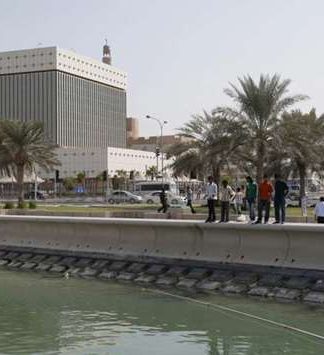Hottest ever start to June as global temperatures spike
It is the first time June has breached the crucial 1.5C temperature threshold, the European Union’s Copernicus Climate Change Service says.
Victoria Seabrook
Climate reporter @SeabrookClimate
Thursday 15 June 2023 15:07, UK
Listen to this article
0:00 / 3:29
1X
BeyondWords
Audio created using AI assistance
People enjoy the weather on the beach as temperature hits 30C (86F) across parts of the UK this weekend, in Seaford, Britain, June 10, 2023. REUTERS/Carlos Jasso
Image:
This June has been hotter than usual, say scientists
Why you can trust Sky News
The world has just experienced its hottest ever first eleven days of June.
For the first time ever, Earth’s average air temperature was more than 1.5C hotter than before industrial times, according to the European Union’s Copernicus Climate Change Service (C3S).
The 1.5C temperature threshold is a key indicator used to track global heating.
Scientists and all governments have agreed in the Paris climate accord to try to limit permanent warming to no more than 1.5C above pre-industrial levels in order to stave off even worse climate disruption via things like heat, drought, flooding and sea levels.
This temporary breach does not mean the world will forever be that much hotter, but is an indication of how quickly we are approaching that point.
The director of the Met Office, Prof Albert Klein Tank, said: “It is vital to understand that a single exceedance does not imply a breach of the Paris Agreement as this will need to be a long-term average.
“However, the more times we temporarily exceed 1.5C the greater the chance of a permanent exceedance.”
It comes as some taps run dry in southeast England, water companies urge customers to start conserving water and the Met Office raises the wildfire risk to ‘very high’ over much of England and parts of Wales.
Two Environment Agency areas in England are still in drought from last year, Devon and Cornwall and parts of East Anglia, while 28% of mainland EU territory is in drought.
The western Mediterranean in particular is struggling with water supplies, due to persistent lack of rain, hotter temperatures and following an exceptionally dry and warm late winter and spring.
Guardsman lies on the floor during rehearsals for Trooping the Colour1:02
Play Video – Guardsmen faint under blazing sun
Guardsmen faint under blazing sun
Dr Melissa Lazenby, lecturer in climate change at Sussex University said the news should be a “stern warning sign that we are heading into very warm uncharted territory”.
The world’s warmest June followed a month of May that was less than 0.1C cooler than the warmest May on record.
Although this is the first time this limit has been surpassed in June, this is not the first time that the daily global average temperature rise has been above that level.
The threshold was first exceeded in December 2015, and exceeded repeatedly in the winters and springs of 2016 and 2020.
People advised to wear sunscreen and drink plenty of water this weekend as a heatwave is expected to hit the UK.0:50
Play Video – How to survive when ‘hotter then Ibiza’
How to survive when ‘hotter then Ibiza’
Hannah Cloke, professor of Hydrology at Reading University said each new heat record does “not mean we should give up”.
“If we can keep average temperatures to, say, 1.6 degrees, it would lead to significantly better outcomes for millions of people than if we hit 1.7.
“These figures may seem like dry data, but they represent more floods, more droughts, more fires.”
Samantha Burgess, deputy director of the Copernicus Climate Change Service (C3S), said every “fraction of a degree matters to avoid even more severe consequences of the climate crisis.”
Watch The Climate Show with Tom Heap on Saturday and Sunday at 3pm and 7.30pm on Sky News, on the Sky News website and app, and on YouTube and Twitter.
The show investigates how global warming is changing our landscape and highlights solutions to the crisis.
Related Topics
Climate Change






























